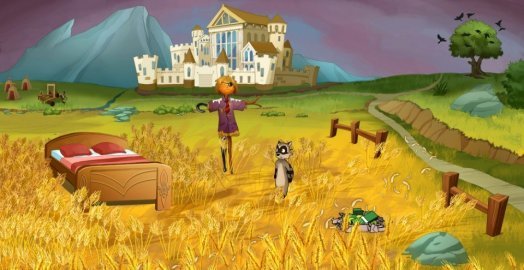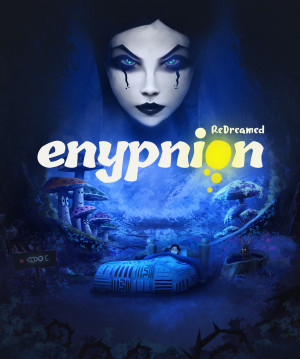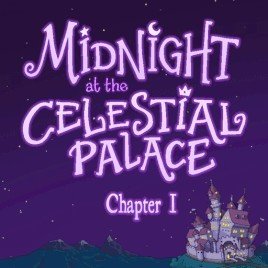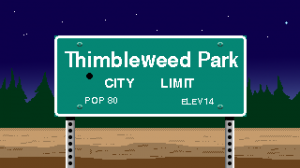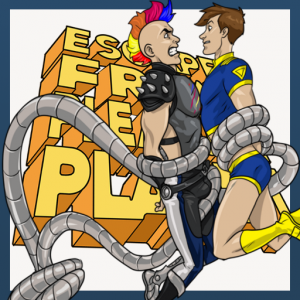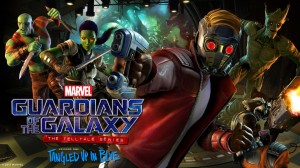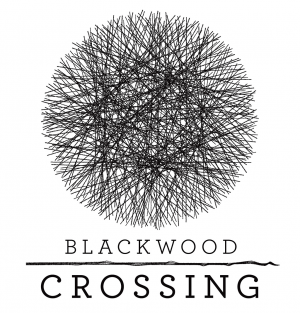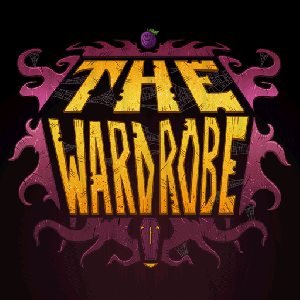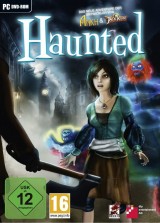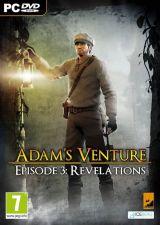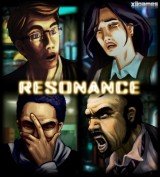Review for Sandra and Woo in the Cursed Adventure
If you've ever lost yourself in your favourite video game, spare a thought for poor Sandra and Woo, who've managed to get themselves actually lost in one, thanks to nefarious hackers, bad timing and a hastily-assembled swan costume. Sandra and Woo in the Cursed Adventure is the first original title from German indie studio Feline Fueled Games, based on the popular web comic. Starring tweenage Sandra and her talking raccoon Woo, it's a mix of gentle comedy, some surprisingly tricky puzzling, and a few too many minigames. Occasionally obscure puzzle solutions slow its momentum at times, but the interesting concept, lovely artwork and engaging and relatable characters keep you coming back for more.
Sandra's a perfectly normal girl, living a perfectly ordinary suburban life with her single parent dad. She's having nightmares about starring in her school play and failing her math test, but who wouldn't? I'm mean sure, her best friend's a Russian pyromaniac artist, her boyfriend's a Burmese freedom fighter, and did I mention that her pet raccoon has a certain dry wit? But other than that she's just the girl next door. At least, until her laptop starts mysteriously glowing green one night and sucks her and Woo (not to mention half the bedroom furniture) into a medieval fantasy adventure game. As we eventually discover, there's a reason for that, and an explanation for why she got drawn in wearing the swan costume she'd just cobbled together for the play, but in the meantime they're off for an epic quest, not to mention a spot of dragon slaying. Because what kind of fantasy adventure would it be without a dragon?
That's not to say Sandra’s friends take her disappearance lying down. It doesn't take long for her boyfriend Cloud (the aforementioned freedom fighter) and Larisa (the friendly neighbourhood firestarter) to come round and discover she's missing. Getting together with Larisa's long-suffering and oddly geeky boyfriend Landon, they're determined to find out what's going on. The action jumps back and forth between fantasy land and suburbia as we follow both Sandra and Woo's adventures and her friends' attempts to rescue them. At different times, you play Sandra, Woo, Larisa, and Cloud, each with their own unique approach to problem solving.
Dividing the action like this not only makes for a more diverse and interesting experience – one minute you're trying to build a bottle rocket in Sandra's yard, the next you're trying to trick your way past palace guards – it also puts an interesting perspective on tweenage life. In many ways it feels like Cloud and co. are the ones on a heroic mission, fighting their way past parents and awkward neighbours, building improvised weapons, and plucking up courage to rescue Cloud’s true love. Meanwhile, Woo's helping a depressed scarecrow and Sandra's trying to find a court jester's lost bell. The two sides of the story contrast well with each other, and neither's quite what you expect.
The hand-drawn graphics, as you might anticipate from a game based on a comic, are great: clean, crisp and colourful. Given that Feline Fueled Games was founded by the comic's writer, it's also no surprise that they nail the look and feel of the original. The difference between the two worlds works well, too; jumping from suburban interiors to lush green fields and a fairy tale castle never got old. If I have a criticism, it's that the setting never feels that expansive: you visit Sandra's and Landon's houses in the real world, and the castle and the dragon's lair in the game, but that's pretty much it. For such a long adventure (between 12-14 hours), you spend a lot of time knocking around in a fairly small number of locations. They're relatively static, too, with only a few background animations. That said, you do get a couple of perspectives on everything, depending on who you're playing at the time, and there's plenty to look at and interact with. The animations that do exist are nicely done, and a lot of actions get their own unique movements, which adds greatly to the character of the… err, characters.
The music is gentle, laid-back and diverse, keeping the mood positive and playful without really standing out. While it does change somewhat between the two worlds, the gameworld getting some nice Renaissance-style themes while the real world tends towards lounge jazz, it's not exactly strict about the distinction. A number of scenes push the music even further into the background in favour of environmental sounds, like birds singing, a washing machine rumbling, or Landon's mother talking on the phone, further enhancing the atmosphere.
Where the music is pleasant without standing out, the voice acting varies between similarly nondescript and downright stilted. Most of the actors are well-chosen, although Larisa struggles to make her Russian accent sound natural, but their delivery ranges from flat to forced emotionally. It just sounds a bit ponderous overall, like the actors have been asked to take it slowly and make sure everything's clear. The translation from German is pretty good, though; there's the odd slightly awkward phrase (the play's called "Wedding with the Swan", for example), but nothing bothersome, and the humour comes through intact.
The interface is pretty straightforward and streamlined: right-click to look and left-click to interact, with an icon of your bag in the top left corner. Your inventory opens either by hovering over the icon, using the mouse wheel, or pressing "I", so there's something for everybody. The only slightly unusual feature appears when you're trying to assemble something, like the swan costume at the beginning of the game. Then, an outline of the object you're aiming for appears as a pseudo-inventory item so you can drag and drop components onto it and, later, use it (the completed outfit, say) like a regular object. It's a neat solution for keeping track of your progress. Finally, there's a hotspot highlighter available by pressing space, although the clean cartoon graphics make that largely unnecessary.
This may seem like a cutesy, breezy kind of game, but the puzzles are actually quite involved and I got thoroughly stuck more than once. They're a mix of (mostly) standard inventory puzzles and minigames, and manage to be simultaneously satisfying and just a little too tricksy for their own good. (That may be sour grapes due to getting stuck so much, but it's kind of telling that an official walkthrough is available as free DLC on Steam.) Overall, although it's a modern game in other ways, when it comes to gameplay it's pretty old-school.
On the one hand, that means arriving in a new area to find a variety of seemingly unrelated items (with quirky commentary), being given a clear goal that doesn't obviously involve any of them, and being let loose to explore. For example, Larisa and Cloud turn up at Sandra's house to find she's not home and have to find a way in by exploring the garden. Let's just say it's not as simple as finding a key under the mat; instead, they both wind up having to solve the problem in their own, very different ways. By the time they make it in, they've tricked the lemonade stand boy next door, trashed the back garden, and driven away the neighbours. And then they have to explain it all to Sandra's father.
On the other hand, though, the solutions can be just a bit of a stretch at times. Despite the fantasy scenario, real-world logic applies most of the time, until it suddenly doesn't. For example, at one point a speech bubble appears above a character's head, filled with exclamation and question marks (you can probably guess how he was feeling at the time). One of the puzzles hinges on you realising that those are actual objects you can pick up and use, and this kind of whimsical cartoon logic crops up just enough to make you feel silly afterwards for not spotting it but not enough for you (or, to be fair, me) to actually think of it in the first place.
Just to rub salt in the wound, you can often ask characters for advice. In a different game, that would be part of the help system, but here it's a running joke for them to give totally useless (if amusing) opinions. Larisa in particular is prone to coming up with fantastically impractical ideas. The gameworld even has its own help system, triggered by the F1 key, that is entertaining but about as helpful as Microsoft error messages (and even gives you a blue screen of death at one point).
Finally, there are the (not so) mini games. There are a generous handful of these, and some of them are so involved that you could package them up and sell them as mobile games in their own right. For example, one has you "hacking" a system by trying to navigate a maze, except you also have to rotate the columns and rows as you go, with obstacles to avoid and a sometimes tight move limit. Another has you playing a Sokoban-like game to escape a cave system against the clock, plus a memory game and one where Woo has to get his DJ on to put together a tune. A lot of care and effort has clearly gone into these, but they all managed to fall just short of enjoyable for me. The move and time limits proved more frustrating than challenging, all the tune elements sounded very similar (but had to be put together in just the right order), and I hopefully don't need to explain why trying at one point to navigate a maze blindfold was less than fun.
The good news is that they can all be skipped, if you prefer, via an option that tells the characters to just do it themselves for once. If you do that with the last one, though, the ending feels anticlimactic: the whole game finishes with a minigame, followed only by a cutscene and the end credits. It's a shame to have to list skipping them as a positive, because they were very nearly fun, but maybe your mileage will vary.
I'm still not quite sure how to feel about the plot. In outline it's actually quite fun and novel, but while the contrast between the two worlds makes for an interesting dynamic, the gameworld setting feels underused. There was scope to make all kinds of jokes at the expense of (say) RPG or adventure tropes, or run into glitches in the programming, or break in and reprogram the game. Instead, for the most part Sandra and Woo may as well have been whisked off to Oz by magic. Also, the abundance of puzzles makes the story more meandering than dynamic.
Then again, it's not really that kind of game. Instead, it's about the characters and how they banter and the people they meet; more about quiet exploration than drama. There's the blustering, clueless king, the feeble prince trying to woo his warrior girlfriend, and the swan princess who might become dinner. There's brave but naive Cloud, mischievous Woo, flamboyantly imaginative and probably quite insane Larisa, and Sandra, just trying to live her life in the midst of it all. They feel like real people who've known each other for years, well enough to simultaneously care deeply about each other and find some of their habits deeply annoying. (Though how Landon and Larisa got together, when she can't stand his bug collection and he's perpetually terrified she'll blow something up, I still don't quite know.)
Ultimately, Sandra and Woo in the Cursed Adventure is a game of heart and rough edges. It brings the web comic to life with some style, and tries to fill the protagonists’ world with chewy puzzles and meaty minigames, but manages to try a little too hard and winds up falling over the line from fun but tricky to hair-tearing and occasionally obtuse. The appeal is all about character, and sending the heroes to a fantasy world really helps to bring that out; just don't hope for too much of a tight storyline. If you're already a fan of the comic, it's easy to recommend this game. And even if you’re not, so long as you're patient (or like to think outside the box), you'll likely find Sandra and Woo to be entertaining companions for an unexpected journey.




